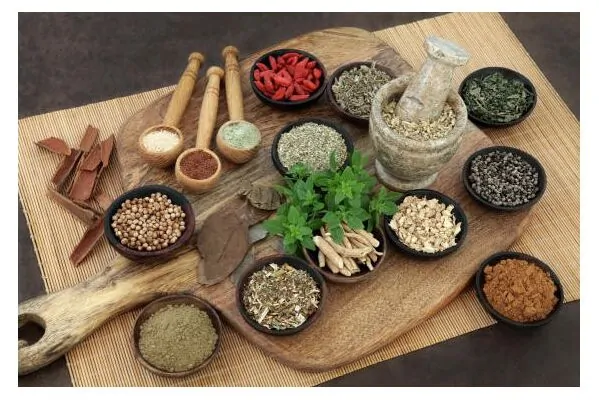Yoga Lifestyle Marketplace
Compatibility in Ayurvedic Herb Combinations

Ayurveda observes a strict compatibility discipline while using herbal combinations. Some edibles are compatible together, whereas some are not. For example, milk and yogurt mixed together are a terrible combination. Let's look at some of the possible combinations for most extensively used Ayurvedic herbs.
Ashwagandha and Triphala -
Ashwagandha is a single herb, whereas Triphala is a combination of 3 herbs - Awla, Haritaki, and Bibhitaka. All these herbs are compatible with Ashwagandha.
All the herbs of Triphala(Awla, Haritaki, and Bibhitaka) are astringent and warm in nature. Ashwagandha is also astringent. All the above herbs are Rasayana or adaptogens. They help to normalize all the functions of the body. Besides, there are no drug interactions or herb incompatibilities reported among any of these herbs. A combination of Ashwagandha with Triphala is the right combination, especially for a person suffering from debility and chronic constipation.
General dosage for an adult – 1 tsp Ashwagandha + 1 tsp Triphala
Ashwagandha and Fenugreek -
Ashwagandha and fenugreek are compatible with each other as both the herbs are hot in temperament, light to digest and unctuous. Both Ashwagandha and fenugreek have a pain-relieving effect on the body. Therefore a combination of Ashwagandha and fenugreek can be the right combination for all kinds of pain disorders with weakness and infirmity. This is also the right combination for old people as they frequently suffer from weakness and pain.
General dosage for an adult – 1 tsp Ashwagandha + 5-6 fenugreek seeds soaked overnight
Triphala & Fenugreek -
Triphala and fenugreek, both are good for pitta and vata dosha. Both are good anti-fever agents. Their Ayurvedic properties are also compatible with each other. A combination of Triphala and fenugreek seeds (fenugreek seeds soaked overnight) provides side effects free relief from chronic constipation, bloating, burping, acidity, and indigestion. It is also perfect for intestinal spasm and frequent stomach ache.
General dosage for an adult – 1 tsp Triphala + 5-6 fenugreek seeds soaked overnight
So, we can see that there is no reason to avoid these very useful combinations. Besides, all the combinations are very light to digest and cause no toxins (ama dosha) in the body.
Who Fenugreek not recommended for
One type of fenugreek that we must all avoid is genetically modified and inorganic fenugreek. According to Ayurveda, an herb grown in unnatural climatic conditions or soil does not have its natural properties.
Besides, genetically modified fenugreek is not recognized as food by the body. Instead, body tags GM fenugreek as a foreign substance. Therefore, a GM fenugreek can trigger auto-immune reactions in the body. Besides, fenugreek full of pesticides and insecticides is never good for the body.
According to Ayurveda, fenugreek is light to digest, unctuous, bitter, and hot in nature. It can be consumed in the form of a veggie (entire plant), or as seeds. Fenugreek seeds soaked overnight can help you deal with bloating, indigestion, farting, and acid reflux. It is also an excellent solution for blood purification and pain control.
According to modern medicine, fenugreek taken in huge dosage (more than 5-6 fenugreek or raw fenugreek powder) can cause malformations in the baby and uterine spasms. However, a small dose can help to prevents bloating and digestive disorders.
Oral consumption of small fenugreek doses is harmless during breastfeeding. In fact, according to Ayurveda, fenugreek can improve the quality of breast milk and prevent stomach-ache in babies. Therefore, a small amount of fenugreek is used in food prepared for new mothers in India.
For children, fenugreek water (water prepared after soaking 6-8 fenugreek overnight) is a better solution, because it reduces the sharp action and has more tolerable taste.
Fenugreek is an excellent herb. However, it is best to consume it under medical supervision. According to Ayurveda, everything has a proper dosage. Fenugreek or any other herb consumed in heavy amount will always jeopardize the digestion.






